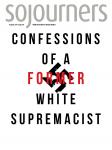THIRTY-FIVE YEARS ago, Cardinal Joseph Bernardin of Chicago called for a “consistent ethic of life”—a broad, underlying attitude of respect for human life and dignity that would apply to issues as diverse as abortion, peace, and the death penalty.
In a 1983 lecture that landed him—and the consistent ethic—on the front page of The New York Times, Bernardin drew connections between nuclear arms and abortion: “The principle which structures both cases, war and abortion, needs to be upheld in both places. It cannot be successfully sustained on one count and simultaneously eroded in a similar situation,” he said.
If only we had listened.
Instead, single-issue voting has become so persistent that most Catholics apparently were able to justify a vote for the likes of Donald Trump as “pro-life,” based solely on his alleged opposition to legalized abortion—a position he himself has inconsistently held. Is it pro-life to drastically cut social programs that poor folks need to survive, in favor of astronomical increases in military spending? Is it pro-life to ban Syrian refugees, while whipping up anti-Islam fervor that results in hate crimes against Muslims already in our country? Is it pro-life to repeal the Affordable Care Act and replace it with a program that would leave tens of millions without health insurance?
I’ve taken to using the hashtag #prolife sarcastically when sharing such news stories. How can people claim to be pro-life while supporting policies under which people will literally lose their lives?
In the 1980s, Bernardin and others pointed out the inconsistency of demonstrating at an anti-abortion march one weekend and advocating for the execution of a death-row inmate the next. It was this inclusion of capital punishment, nuclear weapons, and other social issues that caused conservative Catholics to criticize the so-called “seamless garment of life” approach.
(The “seamless garment” phrase, a reference to Jesus’ robe that his executioners did not tear apart, was first used to describe a holistic reverence for life by Catholic pacifist Eileen Egan in 1973. Bernardin would go on to popularize the phrase.)
Critics claim this approach made all issues morally equivalent—an inaccurate oversimplification and distortion of the consistent ethic, which maintains distinctions between issues. Some conservative Catholics eventually adopted a more expansive “womb-to-tomb” agenda, adding euthanasia, pornography, and embryonic-stem-cell research, while still maintaining that Catholics may have to prioritize one issue over others at the ballot box.
Popes, including traditionalist ones, have supported the consistent ethic. John Paul II’s 1995 encyclical “The Gospel of Life” makes clear that “[w]here life is involved, the service of charity must be profoundly consistent. It cannot tolerate bias and discrimination, for human life is sacred and inviolable at every stage and in every situation; it is an indivisible good.” This is not new; it is part of Catholic social teaching.
But Catholics haven’t been the only Christians broadening their definition of pro-life. Some “new evangelicals” from emergent churches or the evangelical left have come to make connections between issues such as global warming, poverty, and abortion. Although a large majority of younger evangelicals still oppose legal abortion in all or most cases, many are taking a less political approach that involves providing financial, medical, and emotional support for pregnant women, rather than rallying outside abortion clinics.
Yet, despite this progress, inconsistency continues. In fact, the current archbishop of Chicago, Cardinal Blase Cupich, recently wrote that today it is not only the issues, but also the people—“isolated by differences of opinion or politics, race or social class”—that are in silos.
Once we are able to connect with one another, once Christians can become the seamless garment—only then will we be able to respond consistently to the urgent life issues in our world.

Got something to say about what you're reading? We value your feedback!
